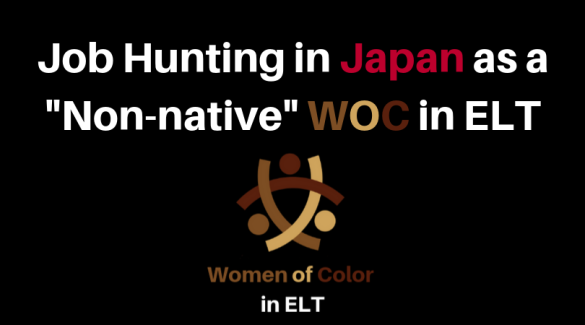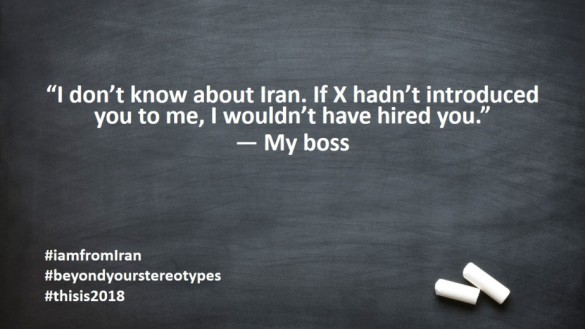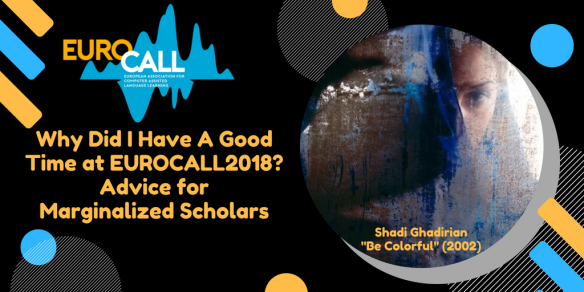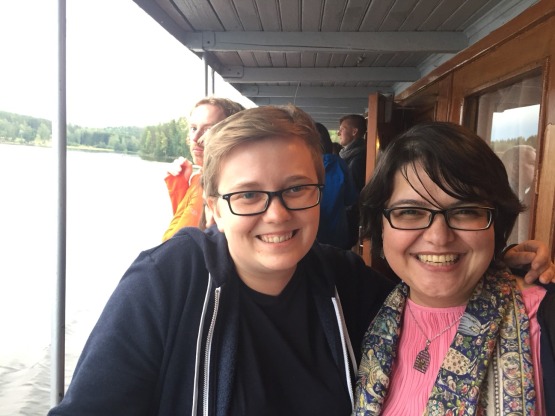Pre-Conference Story
It has been about a year that I do not participate in predominantly white ELT conferences and events, and this has helped me heal in so many ways.

Source: Click here
I got to know about Difference Conference: Living on the Edge: The Joys and Challenges of Being Different in Japan 2019 through a Friend of Color. I noticed that Avril Matsui, the co-founder of the support and friendship group Black Women in Japan (BWIJ) and the creator of the Nagoya Women’s Empowerment Circle, will be presenting and moderating a panel session at this event. I checked the schedule and found Prof. Gerry Yokota’s name among the presenters and I always want to listen to her. So, I decided to attend the conference.
I shared the conference’s flyer on Women of Color in ELT Facebook group and I received a message from one of the members, Prima Shariff. She said she is coming all the way from Oita to attend this conference and asked about accommodation in Osaka. I told her she can stay at my place and we can navigate the conference together.
Prima is from San Jose, California, and she is an ALT (Assistant Language Teacher) at Oita Board of Education. She has recently moved to Japan and Women of Color in ELT did connect us to each other.
Living on the Edge: The Joys and Challenges of Being Different in Japan

To me, the highlight of the Welcome & Opening Remarks was this graphic that I could find on pixabay, and again to me, it means we are different yet not equal. Read this book if you doubt the last two words in the previous sentence: Is Everyone Really Equal?: An Introduction to Key Concepts in Social Justice Education

Source: Click here
The English and Japanese interpretation services were available for the participants. I remember it was mentioned that some toilets are gender neutral at the venue and clearly marked. The conference had a Code of Conduct in both English and Japanese and I think it could have been mentioned during the opening session:
This conference is committed to providing a safe, friendly and welcoming environment for all, regardless of race, gender, gender identity and expression, age, sexual orientation, physical ability, physical appearance, national origin, ethnicity or religion. We welcome vigorous debate while maintaining a respectful community. Discriminatory behavior will not be accepted.
本会議では、人種、性別、性自認・表現、年齢、性指向、身体能力、外見、出身国、民族性および宗教に関わらず、ご参加の皆様に対して、安全、友好的且つ快適な環境を提供することを表明します。互いを尊重するコミュニティ環境を保持すると同時に、活発な討論を歓迎いたします。差別的な行為は一切行わないこととします。
Source: Click here
I also noticed that prayer room was not available and I thought I could mention this somewhere in my blogpost about the conference.
I attended three sessions in the morning, the conference panel session, and one session in the afternoon, and here I will share some of the highlights from these sessions.
Note: I was asked to remove the information about one of the sessions.
Is It Language? Is It Culture? Is It Gender? Or Is It Just Me? by Gerry Yokota

Abstract:
When seeking to understand the causes of miscommunication or conflict, one may consider various differences, such as language, culture, or gender. As a person of mixed ancestry, for example, I may feel excluded from a group I seek to identify with and speculate about the causes of my inability to fit in, but my assumptions may be wildly off the mark. In this session, we will explore how identities and differences affect our interactions, taking cues from a cognitive poetic approach to music. Depending on audience interest, discussion may include possible applications to classroom activities for exploring notions about diversity, inclusion and equity in intercultural communication.
Source: Click here
Gerry started her presentation with a poem, titled Shadowboxing, by Serafin Malay Syquia:
Shadowboxing by Serafin Malay Syquia
in this corner
weighing less than he should
wearing stained trunks
aching from that cavity
unfilled
from that money wasted on paid love
styling monkey suits
blinding spotlightstrusting crooked managers and
fur-lined blondesin this corner
scarred by years of
left jabs and right crosses of
unfilled flushes and snake eyes
staring at closed doors and no
help wanted signsin this corner
leather fingers jabbing rice in
thin Chinese diners in
this corner
he sits a
story
aching
to be told
Gerry then talked about her mixed roots: 1/4 Japanese, 1/4 Austrian, 1/2 Scottish (3/4 white). She shared her racial identity journey with us and explained that she went through a complex process of trying to identify as a minority before realizing she cannot and should not deny the privilege that comes from her 3/4 whiteness.
Gerry introduced some key points for discussion such as:
- Stereotypes
- Self-disclosure
- Self-censorship
- Dependency on external validation
- Unlearning privilege
- The danger of a single story
- Ally-Supporter-Accomplice

Gerry has been active in the anti-apartheid movement in the eighties and has served as Nelson Mandela’s interpreter when he visited Japan in the nineties. You can read more about Gerry’s activities here:
You might also want to listen to Gerry’s Nelson Mandela: A Musical Tribute playlist. I found it while I was searching for her slides.
Gerry then shared another poem with us:
Young and Beautiful by Lana Del Rey
I’ve seen the world, done it all
Had my cake now
Diamonds, brilliant, and Bel Air now
Hot summer nights, mid-July
When you and I were forever wild
The crazy days, city lights
The way you’d play with me like a childWill you still love me when I’m no longer young and beautiful?
Will you still love me when I got nothing but my aching soul?
I know you will, I know you will, I know that you will
Will you still love me when I’m no longer beautiful?I’ve seen the world, lit it up as my stage now
Channeling angels in the new age now
Hot summer days, rock and roll
The way you’d play for me at your show
And all the ways I got to know
Your pretty face and electric soulWill you still love me when I’m no longer young and beautiful?
Will you still love me when I got nothing but my aching soul?
I know you will, I know you will, I know that you will
Will you still love me when I’m no longer beautiful?Dear Lord, when I get to heaven
Please, let me bring my man
When he comes, tell me that You’ll let him in
Father, tell me if You can
All that grace, all that body
All that face makes me wanna party
He’s my sun, he makes me shine like diamondsWill you still love me when I’m no longer young and beautiful?
Will you still love me when I got nothin’ but my aching soul?
I know you will, I know you will, I know that you will
Will you still love me when I’m no longer beautiful?Will you still love me when I’m not young and beautiful?
She finished her presentation by:

What Are You? Gerry’s reading of the 1971 poem by Nobuko JoAnne Miyamoto
Immigration’s Children by Marcio Saiki
Abstract:
In Brazil, Brazilians people used to say that I am Japanese, and here in Japan, Japanese people say I am Brazilian, so who am I? For five years, I was the Director of a Brazilian School in Aichi. Brazilian children from different ages go to this kind of school instead of regular schools in Japan. Why does this happen? First, it is very important to understand about how the Brazilian immigration to Japan since 1990 occurred. Another thing to consider is that this immigration is singular, very rare in the history of human relations, an immigration to the home country of one’s parents or grandparents.
Marico is a photographer and you can follow his art at: https://www.facebook.com/EFMS.Nagoya/
He talked about the Japanese immigration to Brazil and the Brazilian immigration to Japan. He also talked about his personal stories as a child of immigration. I had the chance to ask him where he fully feels belonged and he said Brazil.
These two slides show some examples of racial slurs used against the Japanese people in Brazil.
Final and Critical Remarks
Prima and I expected to see more Black people and People of Color at the conference and we both found the event predominantly white. The only Black woman that I met was Avril. I was the only woman with a headscarf and navigating the conference with Prima helped me a lot enjoy the conference.
I did not write about a session that I attended on positivity in detail. I think it is necessary to mention that wrong information about anxiety and depression was shared during this session, and I personally told the presenter that some folx do need to take medication and “positive” thoughts are not enough to deal with clinical anxiety and depression. I also emphasized that some of the sources of unhappiness and “negativity” come from systemic oppression, and kindness is not the only solution, especially when it is suggested by people who are not affected by those forms of oppression. I am glad some members of TELL—a non-for-profit organization that provides support and counseling services to Japan’s international community—also confirmed this. I hope the reviewers of the next conference will make sure that presentations on such topics do not perpetuate the stigma surrounding mental health and promote toxic positivity instead of genuine optimism.
To me, the highlight of the Youth Perspectives on Difference panel was the part about the experiences of Sheizaf Ume Lee Lugas, the multi-racial panelist. She clearly, confidently, and directly talked about race. She urged us to “fight for something” and she shared her disappointment as she believed “no one really cares.” She mentioned the term social suicide (this term is quite related to race and racial exclusion in society) a couple of times and how she feels like she is experiencing it at school.
During the Q&A, my “too sensitive” racial radar could find an example of a pattern of white dominance, whitewashing the experiences of People of Color, and white saviorism. This might have happened unconsciously and unintentionally, but as we all hopefully know in discussions about race and racism, intention doesn’t matter. Impact does.
I believe when a white man compares his experience of social suicide at school with a multi-racial person who identifies as a Woman of Color and is sharing her experiences of racism, this should be disrupted. Many racial equity advocates have stated that:
- White people should not speak over People of Color and belittle, minimize, and invalidate their experiences of racism by simply saying that “This has happened to me, too” (Refer to Common Patterns of Whites by Dr. Robin DiAngelo—a renowned anti-racism educator and a scholar in the area of Critical Racial and Social Justice Education and Whiteness Studies).
- “When Black people and People of Color talk about race with white people, they do not have the same institutional power as white people who belong to the dominant culture.” Source: Click here
- “Because of white supremacy, many white people—especially white men, who are also influenced by patriarchy—have been conditioned to speak over other people and dominate spaces.” Source: Click here
- “Unfortunately, for white people beginning on their journey of racial awareness, truly listening to others’ stories often requires inserting themselves in the narrative somehow, in order to prevent themselves from denying or resisting what they hear.” Source: Click here
White folx need to be reminded of the following points:
- “Don’t assume, full stop, that you can understand what it’s like to experience racism. You can’t. That’s the whole point.” Source: Click here
- “Understand that nothing in your life has been untouched by your whiteness. Everything you have would have been harder to come by if you had not been born white.” Source: Click here
- “Notice how racism is denied, minimized, and justified.” Source: Click here
- “Approach racial justice conversations with humility.” Source: Click here
- “Recognize that you don’t have all the answers, and People of Color deserve space to be heard without white people talking over them.” Source: Click here
- “Listen to others’ opinions and experiences without trying to interpret them.” Source: Click here
In the Conference Feedback Survey, one of the questions was: How can we make this conference better? Here is my answer:
White voices should not be prioritized above the voices of People of Color. During Q&A, People of Color and other marginalized folx should be prioritized. This could be clearly mentioned at the beginning of the panel session.
The values of whiteness are the water in which we all swim. No one is immune. Those values dictate who speaks, how loud, when, the words we use, what we don’t say, what is ignored, who is validated and who is not. Unless we are actively and persistently dismantling these constructs, we are abiding by them. In integrated spaces (where we are less likely to be ourselves given the divisions that white dominance has created), we fall into the roles society has assigned us. As a Person of Color, and perhaps the only one in the room, it’s exhausting to always be swimming upstream. To survive in this society, we learn to hold our tongue, to “code switch” to fit in. This is about survival and the basic human need to feel that we belong.
Source: Click here
I did hold my tongue and upon reflection, I really felt that it is important to bring this to the attention of conference organizers and I dared to blog about it.
That’s why we need what Gerry referred to as allies, supporters, and accomplices to disrupt when whiteness gets centered as it is not easy for the only ones in the room to constantly deCenter whiteness.
And again, let’s keep in mind that:
As an ally, your role is not to “fix” communities of color. It is not your job to swoop down and take action on their behalf without knowing what the community needs to begin with. It might be easy to succumb to the desire to do things that seem good for others because they make you feel good, but it’s important to resist that urge and reexamine how to help.
Telling a Person of Color how to deal with oppression may seem like a helpful idea, but in reality, it’s harmful. Offering advice implies that the onus is on them, and assumes they have not already made efforts to overcome racial injustice.
Source: Click here
The standing nail and the hammer that we all equally had on our conference badges doesn’t mean that we experience oppression equally.

Some (most?) of us are coming from a point of privilege and we need to understand and acknowledge the difference between being a numerical minority (which is just a statistic) and being marginalized. We should bear in mind that focusing on “diversity” instead of justice is harmful as it upholds the status quo and does not lead to structural change. If you have not read critical work on diversity, you can start with reading and following:
To name a few
@IBJIYONGI, @SaraNAhmed, @alwaystheself, @Ebonyteach, @blackgirlinmain, @CoreyMiles__, @ShanaVWhite, @Bali_Maha, @IjeomaOluo, @KalwantBhopal, @mochamomma, @triciaebarvia, @TchKimPossible, @pgorski
Very Final and Critical Remark
https://twitter.com/ParisaMehran/status/1180799828323753984?s=20
I’d like to thank Prima for sharing her conference photos with me.



































